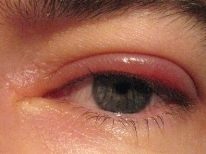Psychosomatic causes of conjunctivitis in children and adults
Inflamed eyes can often be seen in adults, but still children suffer from conjunctivitis more often. However, some complain of inflammation of the eye shell in almost every case of viral or other disease.
This disease is quite dangerous, and in the absence of proper treatment can lead to serious consequences for the health of the organs of sight. But it is necessary to treat a person, regardless of age, not only with prescribed ointments and drops in the eyes, but also psychologically, since eye inflammation has clear psychosomatic reasons. About them and will be discussed in this article.
general information
Conjunctivitis is an inflammatory process that is deployed in the conjunctiva (envelope of the organs of vision). Up to 85% of all cases of eye inflammation cause adenoviruses and only up to 15% of cases in both adults and children are caused by pathogenic bacteria. There is also a non-infectious form of the disease, when the eyes become inflamed with a pronounced allergic reaction.
Conjunctivitis can be both acute and chronic, in which the eye is affected for a long time by an irritant. Predisposing to the occurrence of the disease is considered such circumstances as vitamin deficiency, metabolic disorders, chronic diseases of the nose.
Symptoms are expressed in eyelid edema, lacrimation, inflammation of the eyes, the discharge of pus from them (with a bacterial form).
Conjunctivitis, except for allergic, is contagious and easily passes from one eye, which manifested itself, to another.
More often than others, people with blue eyes suffer from the pathology, because they have a higher level of photosensitivity.
Psychosomatic causes
At first glance, according to the description of the disease, there is absolutely nothing psychosomatic in it - viruses, bacteria, allergens. With them, everything is more or less simple and clear. But this is a misconception, because the predisposition to inflammation of the conjunctiva is not yet clearly explained by medicine. In other words, there are people who have suffered from eye inflammation once in a lifetime, and there are those who, with enviable regularity, are forced to treat conjunctivitis.
Psychosomatics, which studies the relationship of bodily changes with the psycho-factor and the emotional state, considers the problem in a complex, and psychoanalytic doctors were able to establish a fairly clear connection between certain psycho-types and behavioral habits and frequent diseases of the organs of vision.
- The eyes, from the point of view of psychosomatics, are an organ that allows you to see a picture of the world, visually perceive events and information coming from outside. Therefore, conjunctivitis, and almost all other eye diseases, develop not only because of the ingress of bacteria or viruses, but also because the person himself makes this infection possible. He just does not want to see something or someone. He can “close his eyes” and try not to notice certain events, people who are unpleasant to him, their own shortcomings.
If a person has conjunctivitis, it means that something from the outside, what he sees, gives him inner discomfort, heartache. In response to it, the defense mechanism is unconsciously turned on: if pain comes through a vision, it means you need to reduce this vision. So in general terms, and develops conjunctival disease.
- Primary damage to the right eye usually indicates a negative vision of the world, as well as a hostile and painful vision of everything male (often associated with children's psychological trauma, with a father, brother, and their influence). If the problems are mostly with the left eye, psychosomatics suggest that a person negatively sees himself or has childhood injuries due to heavy memories of the mother.
Many researchers emphasize that this is a reasonable approach, because it is the mother who forms the child’s attitude to himself, and the father opens the child to the big world, and the way the child’s communication with the mother and father influences how he perceives himself , the world and yourself in the world.
- A person who with enviable regularity suffers from conjunctivitis, according to psychoanalysts, is usually quite cowardly. He is afraid to face the truth, to open his eyes to reality, he tries to run away from the problem instead of addressing it. He really does not like what he sees, and he would be glad not to contemplate this, but instead of reconciliation with the unpleasant, he becomes annoyed, offended, angry at this negative, which leads to an inflammatory disease.
Psychosomatists note that most often, aggravations of chronic eye inflammation affect those who have a strong fear for their future, it is fuzzy, indistinct, terrible for them, and for this reason already painful.
In children
Children conjunctivitis is most often caused by the fact that the little ones are forced to look at what is unpleasant for them - the quarrels of their parents. Also, the child may be unpleasant presence in the house of a stepfather or stepmother, some children react to their own grandmothers if they show hyper-care.
Adolescent conjunctivitis is associated more with the fear of the future and internal conflicts, during which a young man or girl experiences anger, frustration at the sight of something or someone. Often this is due to certain events and the fear that they can happen again.
The psychotherapist Valery Sinelnikov notes that in adolescence children are more susceptible to conjunctivitis, who often experience feelings such as gloating, for example, when their peers fail.
How to treat?
It is necessary to be treated in a complex. On the one hand, the consultation of an ophthalmologist and the prescription of an appropriate treatment - medication are surely necessary, and after the acute period has passed - a physiotherapeutic treatment. And if in the case of acute conjunctivitis this is quite enough, then chronic disease and frequent relapses are a reason to visit a psychotherapist or a clinical psychologist. The child can be shown to a child psychologist.
Psychotherapy will include techniques that allow a person to change their attitude towards the world and people around them and their own reactions to problem situations.
Fearing the future is recommended relaxation and motivational therapy.
An adult should remember that he sees what he is capable of perceiving. That is, the external always reflects the internal: if a person is aggressive, he sees aggression, if he is greedy, then he sees greed, if he is cowardly, he sees treachery and cowardice.
What you see can clearly and unambiguously suggest what kind of negative quality or feeling you need to work with yourself. It is important to explain in an accessible form to children as well, then problems with organs of sight will become much less.



















